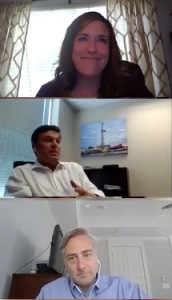 Participants from more than 30 companies attended the PESA Supply Chain Townhall on August 11 to discuss current market conditions and how supply chains have been affected by the COVID-19 pandemic. Supply Chain Committee Member Andrew Little, VP, Business Development, Premium Oilfield Technologies, facilitated the group discussion on real-time best practices for supply chain risk mitigation.
Participants from more than 30 companies attended the PESA Supply Chain Townhall on August 11 to discuss current market conditions and how supply chains have been affected by the COVID-19 pandemic. Supply Chain Committee Member Andrew Little, VP, Business Development, Premium Oilfield Technologies, facilitated the group discussion on real-time best practices for supply chain risk mitigation.
The town hall began with a question about whether Latin America had become a more attractive region for sourcing during the pandemic because of lower risk with logistics, lead time and geopolitics, as well as less uncertainty with tariffs because the USMCA trade agreement has taken effect. While some organizations are not altering strategies within the region, others believe the current environment is speeding up the transition for organizations to make significant changes in their supply chain. Although the geopolitical landscape may be a bit uncertain now, Mexico could become a manufacturing hub for the U.S. as organizations are currently prioritizing reducing risk and possibly moving some supply chains out of Asia.
Supply chains are dealing with changes to supplier contracts and disruptions due to the pandemic, including invocations of force majeure. Some companies are experiencing increased lead times and price increases on critical manufactured items. Others have encountered delays and stoppages due to force majeure claims and have been forced to delay deliveries to their customers. These organizations have proactively communicated with their entire supply base to support customer demands for cost/payment support and have received markedly good responses in the form of discounts or extended payment options. Although some have experienced delays over the past several months, there have not been many significant changes to how contracts have been written.
Since the onset of the pandemic, several companies faced the challenge of maintaining and bolstering strong relationships with customers while working remotely. Several townhall participants agreed their supply chain and approach to customers hasn’t changed much while working remotely. There are fewer in-person meetings, but participants said that hasn’t had a discernible effect on internal business or external coordination and relationships. Increased virtual communication has enabled continued success and has generated momentum regarding projects, vendor relationships and internal business processes.
Another challenge over the past six months has been demands for price reductions. Several companies say they’re analyzing the nature of the business. If it’s a more long-term strategic partnership, they’re working to accommodate pricing concession requests by allowing the change to be absorbed throughout the entire supply chain. If the nature of the business is more tactical and general market supply/demand oriented, then most companies are prioritizing cash-flow over making a profit during the downturn.
Other organizations have not made many pricing concessions and in general have not demanded pricing concessions from suppliers. Participants acknowledged that some suppliers will not survive through the pandemic and demanding pricing concessions could push vulnerable companies teetering on the edge of solvency into bankruptcy. The consensus among townhall participants was that working with suppliers in a collaborative manner on manufacturing, competitive technologies, and cost reduction initiatives is a more robust and sustainable long-term supply chain strategy that shouldn’t be altered because of the pandemic.
The group discussed how they’re balancing engineers requesting specific sourcing decisions with maintaining supplier relationships. Several companies have been successful influencing the use of preferred suppliers by agreeing on cross-functional evaluations of multiple supplier evaluations. Supply chains are enhancing R&D collaboration with engineering groups by embedding feasibility assessments on materials and manufactured parts from the beginning. Teamwork and communication have been critical as companies reduce vendor bases and create primary, alternate, contingency and emergency vendors for various segments of their businesses.
Organizations are assessing processes and procedures to determine ways to be more effective and efficient including establishing collaborative approaches with other arms of the business to align processes and create a unity of effort. In addition, companies are finding benefits in diversifying supplier bases regionally. During the pandemic, there’s more focus on short-term and immediate needs versus long-term planning.
As travel limitations continue, companies are handling manufacturing site audits and process inspections in various ways. They’ve been restricting local supplier face-to-face audits to critical processes and have been able to conduct some in person with the use of PPE. Many supplier audits, process inspections, and test witnessing are conducted using remote technology, including desktop documentation reviews. While these approaches meet requirements to keep facilities in production, companies recognize the potential risk of a failure going undetected because staff isn’t onsite, listening and observing.
For more information regarding future Supply Chain Townhalls, contact Senior Director Membership Services Peggy Helfert.




